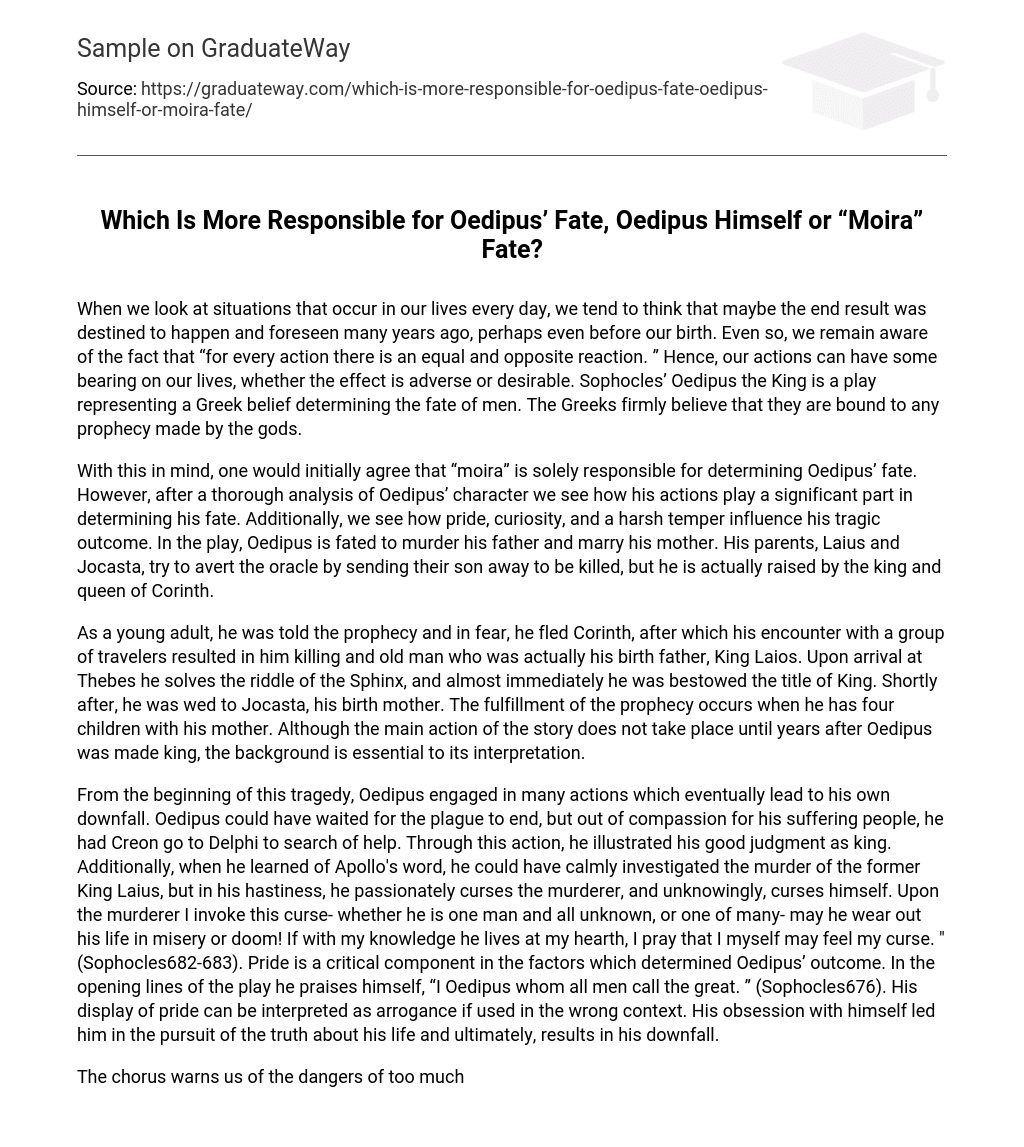Every day, we question whether the end result was predestined before our existence. Nonetheless, we acknowledge the principle stating that “every action has a corresponding reaction.” Thus, our actions can impact our lives and lead to favorable or adverse outcomes. Sophocles’ play Oedipus the King reflects the Greek belief that fate is dictated by deities and must be fulfilled.
Initially, it is acknowledged that “moira” is the sole determinant of Oedipus’ fate. However, upon closer scrutiny of his character, it becomes evident that his actions also play a significant role in shaping his destiny. Moreover, his tragic outcome is influenced by his pride, curiosity, and harsh temper. In the play, Oedipus has an unavoidable fate to kill his father and marry his mother. To prevent this prophecy from becoming reality, Laius and Jocasta make the decision to have their son killed. Nevertheless, he ultimately ends up being raised by Corinth’s king and queen.
Oedipus was given a prophecy during his youth and, out of fear, he fled from Corinth. While traveling, he accidentally killed an old man who was later revealed to be his true father, King Laios. When he arrived in Thebes, Oedipus successfully solved the riddle of the Sphinx and was proclaimed king. He then married Jocasta, who turned out to be his biological mother as well. Together, they had four children from their incestuous relationship. Although the main events of the story take place many years after Oedipus became king, understanding the background is essential for proper comprehension.
Throughout the tragedy, Oedipus made various choices that ultimately resulted in his own downfall. Rather than waiting for the plague to subside, he displayed compassion for his suffering people and dispatched Creon to Delphi seeking assistance – a wise decision as king. However, upon learning of Apollo’s message, he failed to calmly investigate King Laius’ murder. In his haste, he passionately cursed the murderer without realizing it was himself whom he had cursed. He proclaimed,”Upon the murderer I invoke this curse- whether he is one man and all unknown, or one of many- may he wear out his life in misery or doom! If with my knowledge he lives at my hearth, I pray that I myself may feel my curse.” (Sophocles 682-683). Pride played a pivotal role in determining Oedipus’ fate. At the beginning of the play, arrogantly praised himself by stating,”I Oedipus whom all men call the great.” (Sophocles 676). This display of pride could be perceived as arrogance in specific contexts. His excessive self-centeredness drove him to uncover the truth about his life – an endeavor that ultimately led to his downfall.
The text cautions against the perils of excessive pride, emphasizing that those who are arrogant and disregard justice and the gods will suffer a dreadful fate as a result of their prideful heart. Additionally, individuals who acquire wealth through unjust means and commit impious acts will leave their souls susceptible to divine punishment. Similarly, Oedipus’ downfall was also influenced by his fiery temperament, evident in numerous instances of him losing his temper during clashes with Creon and Teiresias (699).
In a conversation with Teiresias, Oedipus expresses his anger and holds nothing back. He goes as far as to accuse Teiresias of being the murderer if he had eyes. (685). As the play progresses and everything is revealed, Oedipus becomes filled with self-loathing yet still maintains a strong temper. This is evident when he angrily exclaims that he should be taken away as the most accursed, hated by God more than any other person on earth. (711). Oedipus’ pride, temper, swiftness, and suspicion, along with his relentless pursuit of the truth, contribute to the fuel that ignites the fire leading to his tragic downfall.
The events in Oedipus the King illustrate the coexistence of man’s free will and the Greek belief in a guiding fate that unifies the universe. Man possesses the freedom to determine his own path and bears ultimate responsibility for his actions. The role of both fate and free will was pivotal in Oedipus’ downfall, but he was not mere puppet of destiny. From birth, it was fated for Oedipus to eventually wed his mother and slay his father, as prophesied by the oracle. Despite his efforts to avert this predestined outcome, it would inevitably transpire.
While destiny influenced Oedipus’s past actions, he also made active choices in Thebes. However, his character and knowledge undergo a sudden reversal of circumstances when a messenger discloses his true parentage. This occurrence serves as a reminder to contemplate our own lives and acknowledge how our past and present actions ultimately mold our future.
The text illustrates that sometimes, the desired outcome can unexpectedly turn out to be the opposite of previous actions. Oedipus serves as an example, as he unknowingly commits actions in his past life that ultimately determine his future. Despite trying to avoid the predicted result and alter his course of action, it is Oedipus’s curiosity that eventually leads him to a shocking discovery – exposing his own wrongdoing. Sophocles prompts us to ponder how much control humans truly possess over their destiny. Throughout the play, we witness how Oedipus himself has shaped his own future through his actions, ultimately influencing the outcome of his fate and realizing that true destiny cannot be evaded.





